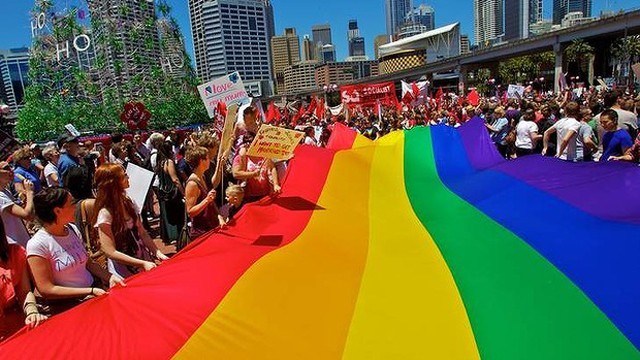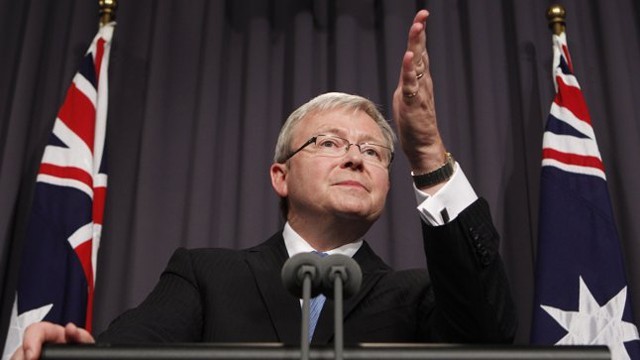Advocates of same-sex marriage say Kevin Rudd’s return as prime minister will increase pressure on Opposition Leader Tony Abbott to allow a conscience vote on the issue, regardless of who wins the election this year.
Mr Rudd’s 57-45 vote victory over Julia Gillard at a caucus meeting on Wednesday makes him the first sitting Australian prime minister to support same-sex marriage.
The co-convener of the Rainbow Families Council, Felicity Marlowe, said if Labor won the election her organisation would hope for legislation allowing same-sex marriage to be introduced within the first 100 days of the next Parliament.

Protesters in Sydney call on the Labor Party to support same-sex marriage. Some advocates are optimistic that Kevin Rudd’s elevation to the leadership will help their cause. Photo: Domino Postiglione
In a blog post in May, Mr Rudd said he had decided to support the right of same-sex couples to marry after a “difficult personal journey” during which he weighed Christian teaching, scientific data and “the emerging reality in our communities” where more same-sex couples were seeking equal rights.
“Labor provides a conscience vote.
The Liberals and the Nationals do not. They should. If they don’t, then we should consider a national referendum at an appropriate time,” Mr Rudd said.
Rodney Croome, the national director of Australian Marriage Equality, said Mr Abbott was under much less pressure to allow Coalition MPs a conscience vote while Ms Gillard was prime minister as she also opposed marriage equality.
“There were some MPs who didn’t vote for it because they didn’t want to look disloyal and others who just had less of an incentive to stick their necks out,” Mr Croome said.
He said he had no reason to doubt that the reasons Mr Rudd gave for his change of heart were “very credible and heartfelt” but “he is also a politician and, like all politicians, he will have his eye on the impact of that”.
Mr Croome predicted support for marriage equality would boost Mr Rudd’s appeal with young voters, a group he singled out after his caucus win.
Mr Rudd’s return to power came on the same day the US Supreme Court found a federal law that prevented government agencies recognising gay marriage was unconstitutional.
As a result, in the 12 states that recognise gay marriage, federal agencies must do the same, opening access to legal protections and benefits.
New Zealand and France recently legalised same-sex marriage and a similar bill is before the House of Lords in Britain.
Last week, Liberal senator Sue Boyce crossed the floor to vote in favour of a Greens-sponsored bill recognising the same-sex marriages of Australians overseas. The bill was defeated 45 votes to 28.
Greens deputy leader Adam Bandt, whose same-sex marriage bill in the lower house did not come to a vote, said Mr Rudd’s stated support for marriage equality was “a silver lining of the Labor factional coup”.
But he said the main parties remained internally divided on marriage equality.
The Australian Christian Lobby opposes a conscience vote, with managing director Lyle Shelton saying: “Issues of public policy that impact on the human rights of children, freedom of speech and freedom of religion should be a matter of clear party policy as a matter of principle”.
Author: Vince Chadwick
Publication: Sydney Morning Herald National Times
Date: 27 June 2013

